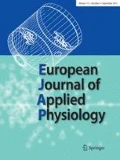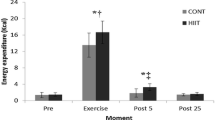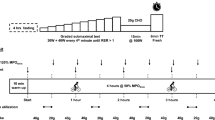Summary
The present investigation examined the influence of dietary carbohydrate (CHO) on the performance of supramaximal intermittent exercise. A group of 14 moderately trained male students [mean age 21.0 (SD 1.6) years] completed a maximal oxygen consumption test and two identical ‘maximal interval tests’ (MIT, and MIT2) over a 10-day experimental period. Each MIT involved five 60-s all-out periods of cycling (against 0.736 N · kg−1 body mass), with each period separated by 5 min of passive recovery. All subjects consumed a moderate CHO diet for 3 days preceding MIT1 (55.3% of energy intake as CHO) and were then randomly assigned to either a high CHO (83%), moderate CHO (58%) or low CHO (12%) diet for the 3 days separating MIT1 and MIT2. All food and drink consumed during the experimental period was weighed and recorded for later dietary analysis. Measurements of work done, exercise oxygen consumption (\(\dot V\)O2), venous blood pH, plasma lactate and plasma glucose concentrations were compared between interval tests. Independent Student's t-tests revealed that the 5.6% increase in total work done recorded by the high CHO group and the 2.3% increase by the moderate CHO group between MIT1 and MIT2, were significantly different to the 5.4% decrease in performance recorded for the low CHO group (P<0.001 and P<0.01, respectively). No significant differences in performance changes was found between the high and moderate CHO groups; 10 subjects in each of these groups would have been necessary to attain significance at the 0.05 level using the same procedures. No changes in \(\dot V\)O2, venous blood pH, plasma lactate or glucose concentrations were found among the groups. These data showed that when compared to a low CHO diet, a moderate/high intake of dietary CHO could at least maintain the performance of supramaximal intermittent exercise. The results emphasise the importance of dietary CHO for athletes whose activities involve repeated periods of very high intensity exercise.
Similar content being viewed by others
References
Bangsbo J, Norregaard L, Thorsoe F (1992) The effect of carbohydrate diet on intermittent exercise performance. Int J Sports Med 13:152–157
Bergstrom M, Hultman E (1967) A study of the glycogen metabolism during exercise in man. Scand J Clin Lab Invest 19:218–228
Boobis L, Williams C, Wootton SA (1982) Human muscle metabolism during brief maximal exercise. J Physiol (Lond) 338:21–22P
Cheetham ME, Boobis LH, Brooks S, Williams C (1986) Human muscle metabolism during sprint running. J Appl Physiol 61:54–60
Ekblom B (1986) Applied physiology of soccer. Sports Med 3:50–60
MacDougal JD, Ward GR, Sale DG, Sutton JR (1977) Muscle glycogen repletion after high intensity intermittent exercise. J Appl Physiol Respir Environ Exerc Physiol 42:129–132
MacLaren DP, Gibson H, Parry-Billings M, Edwards RHT (1989) A review of metabolic and physiological factors in fatigue. Exerc Sports Sci Rev 17:29–68
Maughan RJ, Poole DC (1981) The effects of a glycogen loading regimen on the capacity to perform anaerobic exercise. Eur J Appl Physiol 46:211–219
McCartney N, Spriet LL, Heigenhauser GJ, Kowalchuk JM, Sutton JR, Jones NL (1986) Human power and metabolism in maximal intermittent exercise. J Appl Physiol 60:1164–1169
Schofield WN (1985) Predicting basal metabolic rate, new standards and review of previous work. Human Nutrition: Clinical Nutrition 39c [Suppl 1] 5–41
Taylor HL, Buskirk E, Henschel A (1955) Maximal oxygen uptake as an objective measure of cardio-respiratory performance. J Appl Physiol 8:73–80
Thomson JA, Green HJ, Houston ME (1979) Muscle glycogen depletion patterns in fast twitch fibre subgroups of man during submaximal and supramaximal exercise. Pflügers Arch 379:105–108
Wootton SA, Williams C (1984) Influence of carbohydrate status on performance during maximal exercise. Int J Sports Med 5 [Suppl]:126–127
Author information
Authors and Affiliations
Rights and permissions
About this article
Cite this article
Jenkins, D.G., Palmer, J. & Spillman, D. The influence of dietary carbohydrate on performance of supramaximal intermittent exercise. Eur J Appl Physiol 67, 309–314 (1993). https://doi.org/10.1007/BF00357628
Accepted:
Issue Date:
DOI: https://doi.org/10.1007/BF00357628




